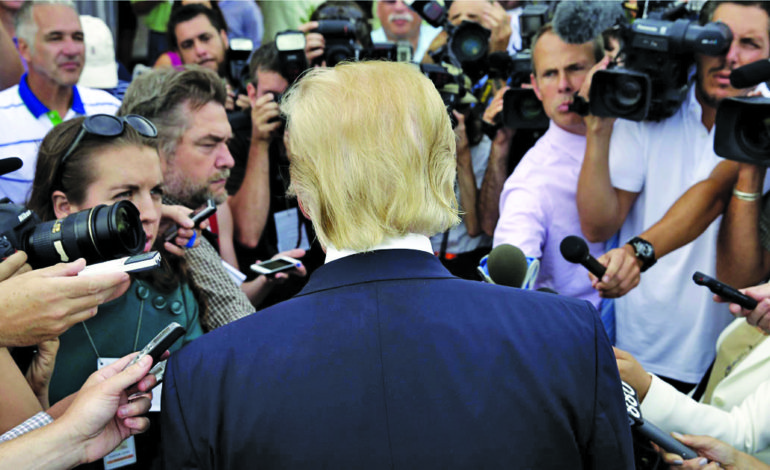By Lee H. Hamilton
Because we live in such tumultuous political times, it’s easy to believe that today’s intense public focus on the Trump presidency is something new — an obsession like none we’ve ever seen before. Yet to one degree or another, the president has always been at the center of the public’s attention.
This is because he or she is the central actor in American government. The sheer complexity of our system, with its three branches, separation of powers and competing centers of power, demands someone who can make it work.
So we have high expectations for the president in this country. We want him or her to run the government efficiently and effectively, to work hard to resolve our problems, lead the world, inspire the nation, console us in times of disaster, serve as an example for young people, represent the national interest and in a sense carry our hopes and desires for the country on his or her shoulders.
Which is why, no matter who’s president, there is enormous public curiosity about every detail of his life and actions. When I was in Congress, the subject would come up whenever I was back home in the district, at formal public meetings and in casual conversations. People wanted to know about his family, his personal characteristics, his strengths and failings and what he was doing to make the country work.
This fascination is exacerbated by the news media, which focuses attention on the president and much less on Congress, a body that by its nature is diffuse and complicated.
Presidents are both ordinary and extraordinary. They have all the strengths, vulnerabilities and limitations of the rest of us. They may be perceptive, politically astute, even wise, but they all make mistakes — the interning of Japanese Americans under Franklin Roosevelt, Ronald Reagan’s dereliction of duty in Iran-Contra, the handling of the Vietnam War under LBJ.
Yet there’s also something out of the ordinary about the people who become president. You have to be driven by ambition to seek the office in the first place, as well as highly competitive and disciplined in both thought and speech. The most effective presidents are unusually persuasive. The greatest among them have a real connection to the American people, a sense of high moral purpose and the ability to summon Americans to reach toward that purpose.
Because as unremittingly difficult as the job is, in many ways the toughest part is persuasion: Trying to build support for one’s goals. We talk about the president as being the most powerful person in the world, but over the decades I’ve been struck by how often presidents talk about the limitations on their power. Looking out from the White House, what they see are opposition and constraints.
Which may be why every president seeks to expand the power of the office, usually with some degree of success. This is not all bad — presidents do need power to get things done. But this trend has diminished the role of Congress and, fundamentally, of representative government. President Nixon had some 300 people on his staff; presidents these days may have as many as 2000.
This has allowed the president to insulate himself. Presidents are hard to reach today. They don’t want to be scrutinized on policy and, far too often, Congress has played along. The presidential press conference has also faded in importance. Presidents rarely have to answer questions in a free-wheeling give and take session with journalists or other politicians.
And so it’s harder to understand why the president does what he does now, why he makes the choices he does. Presidents need oversight and scrutiny; they need a Congress that will press them and insist on consultation. They get very little of that pressure today. Don’t get me wrong: I favor a strong president, but I also favor a strong Congress. And these days, we have a Congress marked by passivity and inability to exercise its constitutional responsibilities.
I’m equally impressed by the responsibility we have as citizens in choosing our leaders. We get what and whom we choose. Presidents really do make a difference in our lives. No choice as a citizen is more important.
-Lee Hamilton is a senior advisor for the Indiana University Center on Representative Government; a distinguished scholar, IU School of Global and International Studies; and a professor of practice, IU School of Public and Environmental Affairs. He was a member of the U.S. House of Representatives for 34 years.






Leave a Reply